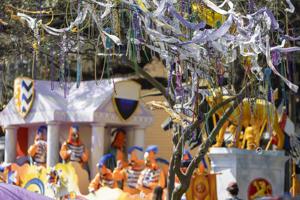
Louisiana enjoys spectacular carnival celebrations that bring joy to locals and visitors alike. As thoughts now turn to the 2024 parade season and possible new regulations — both city and state — it bears noting that parades constitute core First Amendment activity. This is a lesson that leaders need to take to heart.
New Orleans City Council President JP Morrell recently proposed aggressive new regulations of krewes: “There needs to be a mechanism where there’s some curation on behalf of the mayor’s Mardi Gras advisory committee.”
Morrell’s hook for this regulatory initiative: “The public funds Mardi Gras,” providing policing and sanitation support that “amounts to millions upon millions of dollars of public money.”
What’s more, he apparently believes that parading organizations enjoy access to the city’s streets through the grace of the city’s government: “I have to remind krewes all the time, these are not taxi cab medallions” and the carnival organizations “have no vested property right in your route.”
Meanwhile, state Rep. Foy Gadberry, R-West Monroe, has introduced a bill that would require carnival krewes across Louisiana to pay for the clean-up costs associated with their parades. He asks: “Why should the city pay that cost?”
The answer is simple: The First Amendment requires it.
First, a city’s streets and sidewalks constitute “traditional public forums” that We the People have a constitutional right to access for First Amendment activities. The U.S. Supreme Court has held that streets “time out of mind, have been used for purposes of assembly, communicating thoughts between citizens, and discussing public questions” and such use “has, from ancient times, been a part of the privileges, immunities, rights, and liberties of citizens.”
To be sure, a city may adopt and enforce content-neutral, reasonable time, place and manner regulations — including limits on the net number of parades. Yet, despite a moratorium on new parade permits, New Orleans issued a new permit for the Legion of Mars, a carnival organization comprised of first responders.
It’s an understandable decision — but the First Amendment does not allow the government to favor some speakers over others simply because it particularly likes the speakers, their message, or both. The decision also belies the city’s claim that it cannot sustain more than 30 annual parades.
Second, parades constitute inherently expressive activity that enjoys strong First Amendment protection. The Supreme Court flatly rejected the government’s claim that it could regulate Boston’s annual St. Patrick’s Day parade as a “public accommodation” and subject it to a state anti-discrimination ordinance. It found that parades constitute “a form of expression, not just motion” and possess “inherent expressiveness,” which “explains our cases involving protest marches.”
Moreover, “a private speaker does not forfeit constitutional protection simply by combining multifarious voices, or by failing to edit their themes to isolate an exact message as the exclusive subject matter of the speech.”
If the Boston parade constitutes constitutionally protected expressive activity, so do Louisiana’s carnival parades.
Nor can the government either refuse to cover the cost of policing parades or attempt to shift the costs of speech activity against would-be speakers.
In Forsyth County, Georgia, the Supreme Court rejected a local government’s effort to shift merely some of the policing costs associated with an overtly racist organization’s parade onto the organizers. Even though the enhanced parade fee was not exorbitant (only $1,000), a “tax based on the content of speech does not become more constitutional because it is a small tax.” And in a case involving a proposed Nazi Party March In Skokie, Illinois, federal courts established a clear constitutional rule that the government cannot tax the costs of speech activity against would-be speakers.
Finally, carnival krewes are private associations, not municipal creations, and therefore enjoy broad First Amendment protection under the constitutional freedom of association.
In light of these constitutional realities, the city and state should pursue a policy of constructive engagement — not regulatory command — that seeks the krewes’ voluntary cooperation with ongoing efforts to make Mardi Gras the very best it can be.
On the other hand, if a government takes the approach that parades can be regulated the same way as taxi cabs, vacation rentals, or liquor stores, it will likely to find itself in federal court — where it will not prevail on the merits.
Ronald Krotoszynski, Jr. is the John S. Stone Chair, Director of Faculty Research and Professor of Law at the University of Alabama School of Law, where he writes and teaches about constitutional law. Since 1982, he has ridden with four New Orleans krewes and currently belongs to two parading organizations.

Leave a Reply